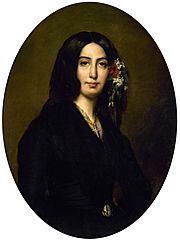Pseudonym facts for kids

A pseudonym (soo-do-nim) is a fake name a person uses instead of their real name. Many people use pseudonyms, including authors (pen names) and performers (stage names). People use pseudonyms for several different reasons: to hide identity, gender, and/or race. People (such as rappers) also use pseudonyms to match their stage personality better. Pseudonyms can include stage names, screen names, ring names, pen names, nicknames, aliases, superhero identities and code names.
Pseudonym comes from the Greek word ψευδώνυμον (pseudṓnymon), which means "false name".
Use and Examples of Pseudonyms
There are three main types of pseudonyms: pen names, stage names and user-names. Pen names are used by authors, usually to hide identity. Many famous books, such as The Outsiders and A Series of Unfortunate Events, have been written by authors using a pseudonym. Daniel Handler wrote A Series of Unfortunate Events under the pseudonym Lemony Snicket both because he wanted to make the author a character in the story and because he wanted to hide his real name. When she published The Outsiders, Susan Eloise Hinton decided to use her initials, S. E., instead of her first and middle names, because she did not want readers to guess her gender. The Brontë sisters (Anne, Emily and Charlotte) used pseudonyms to hide the fact that they based many of their characters on their neighbors.
Musicians, actors and performers also use pseudonyms, called stage names, both to hide their identity and to give themselves a "cooler" name. For example, rapper Sean Combs is currently known by Diddy, but used to call himself P Diddy and Puff Daddy. He says that he changed his name from P Diddy to Diddy because the name "caused confusion and he wanted to 'simplify things'."
Many people on the Internet use pseudonyms. There are many names for these pseudonyms, including user-names, user IDs and handles. These pseudonyms help people stay anonymous on the internet, and they also protect people from identity theft and phishing. When people log into an account on sites like Wikipedia, MySpace or Facebook, their user-name helps identify them without entering their real name. If people used their real name instead of a user-name, it would create confusion for two people with the same name. Usernames make this simple, because people create their own user-names. Also, if someone used their real name, it would make it easier for people to guess their passwords and for other people to find them in real life.
Sometimes criminals would use a pseudonym. For example, com man Jefferson R. Smith was also known as Soapy Smith.
Nom de guerre ("war name")
In Ancien Régime France, a nom de guerre ("war name") would be adopted by each new recruit (or assigned to them by the captain of their company) as they enlisted in the French army. These pseudonyms had an official character and were the predecessor of identification numbers: soldiers were identified by their first names, their family names, and their noms de guerre (e. g. Jean Amarault dit Lafidélité). These pseudonyms were usually related to the soldier's place of origin (e. g. Jean Deslandes dit Champigny, for a soldier coming from a town named Champigny), or to a particular physical or personal trait (e. g. Antoine Bonnet dit Prettaboire, for a soldier prêt à boire, ready to drink). In 1716, a nom de guerre was mandatory for every soldier; officers did not adopt noms de guerre as they considered them derogatory. In daily life, these aliases could replace the real family name.
Noms de guerre were adopted for security reasons by members of World War II French resistance and Polish resistance. Such pseudonyms are often adopted by military special-forces soldiers, such as members of the SAS and similar units of resistance fighters, terrorists, and guerrillas. This practice hides their identities and may protect their families from reprisals; it may also be a form of dissociation from domestic life. Some well-known men who adopted noms de guerre include Carlos, for Ilich Ramírez Sánchez; Willy Brandt, Chancellor of West Germany; and Subcomandante Marcos, spokesman of the Zapatista Army of National Liberation (EZLN). During Lehi's underground fight against the British in Mandatory Palestine, the organization's commander Yitzchak Shamir (later Prime Minister of Israel) adopted the nom de guerre "Michael", in honour of Ireland's Michael Collins.
Revolutionaries and resistance leaders, such as Lenin, Stalin, Trotsky, Golda Meir, Philippe Leclerc de Hauteclocque, and Josip Broz Tito, often adopted their noms de guerre as their proper names after the struggle. George Grivas, the Greek-Cypriot EOKA militant, adopted the nom de guerre Digenis (Διγενής). In the French Foreign Legion, recruits can adopt a pseudonym to break with their past lives. Mercenaries have long used "noms de guerre", sometimes even multiple identities, depending on the country, conflict, and circumstance. Some of the most familiar noms de guerre today are the kunya used by Islamic mujahideen. These take the form of a teknonym, either literal or figurative.
Related pages
See also
 In Spanish: Alias para niños
In Spanish: Alias para niños

